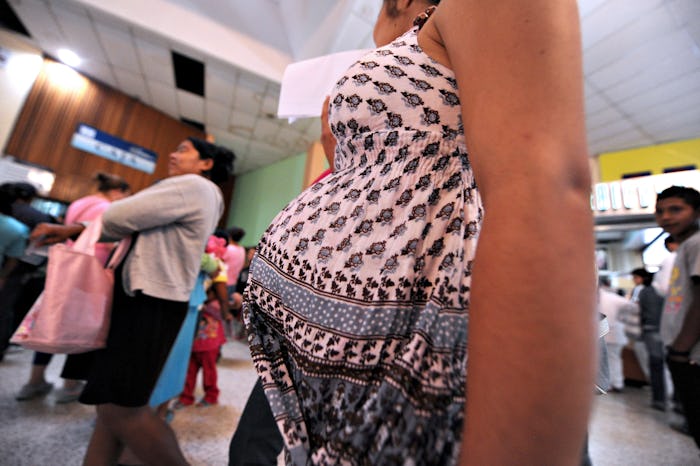
Can You Get An Abortion If You Have Zika? It's Not Likely Women Will Be Able To
Recent reports show that the Zika virus is slowly making its way to the U.S. signaling that it might be time to think about how states will handle screening, testing, and whether or not women can get an abortion if they have Zika. A recent report from Mother Jones illustrates pretty clearly that infected women might not even be able to consider terminating their pregnancies if they're infected with the virus due to lack of resources, timing restrictions, and varying laws among states in the U.S. and abroad. It's a very complicated situation. So far, there have been reports of Zika virus in New York, Florida, and Texas, but as the weather warms it's likely, according to the Centers for Disease Control and Prevention, that the virus can spread up the East coast and in Hawaii.
The lack of family planning resources in Latin America was a concern as soon as news of the connection between Zika virus and microcephaly, and other types of developmental issues with fetuses became clear. In Latin America, some countries urged women to put off getting pregnant altogether, which is pretty much impossible without access to birth control and no access to abortions. In the U.S. restrictive abortion laws in the states that could likely be hit the hardest by a Zika epidemic will also prevent infected women from getting an abortion.
New York is currently putting together over 20,000 kits to distribute to women that include condoms and insect repellent to in preparation for a possible outbreak of Zika virus. Currently, there are only a few states that ban abortions even in the case of genetic abnormalities like microcephaly, but even then, some states require that those anomalies be lethal.
It also comes down to when states allow abortions. The timing of effective Zika testing and most states' abortion regulations just don't line up. The CDC has recommended that fetal ultrasounds are the best way to detect fetal abnormalities for Zika affected women, but those with symptoms of Zika could go weeks without knowing that they'd been infected. According to Mother Jones, symptoms of microcephaly wouldn't be present until the very end of the second trimester or the beginning of the third, rendering the question of getting an abortion pretty much moot. Neil S. Silverman, a physician and professor in the division of maternal-fetal medicine at UCLA told Mother Jones, "If we diagnose the woman with an abnormal fetal brain at 22 weeks, it's not helpful because she won't have the full range of options available to her."
In terms of planning for a possible Zika outbreak, states would need to act quickly to decide whether or not to alter laws to allow earlier abortions, or in some cases, simply choose to fund family planning resources like Planned Parenthood centers. That's not likely to happen anytime soon. Even the Republican frontrunner for president, Donald Trump, who has flip-flopped throughout the years on the topics of funding Planned Parenthood and abortion said this week that abortion laws should not be altered in any scenario.
The CDC held a summit on Friday for U.S. governors and state politicians to talk about preventative steps to handle a possible Zika outbreak, and you can even catch a live stream of the talks. Discussing abortion options for women in states that outlaw the medical procedure is not officially on the agenda, but as the possibility of Zika virus spreading throughout most of the U.S. it's definitely worth bringing up. Soon.